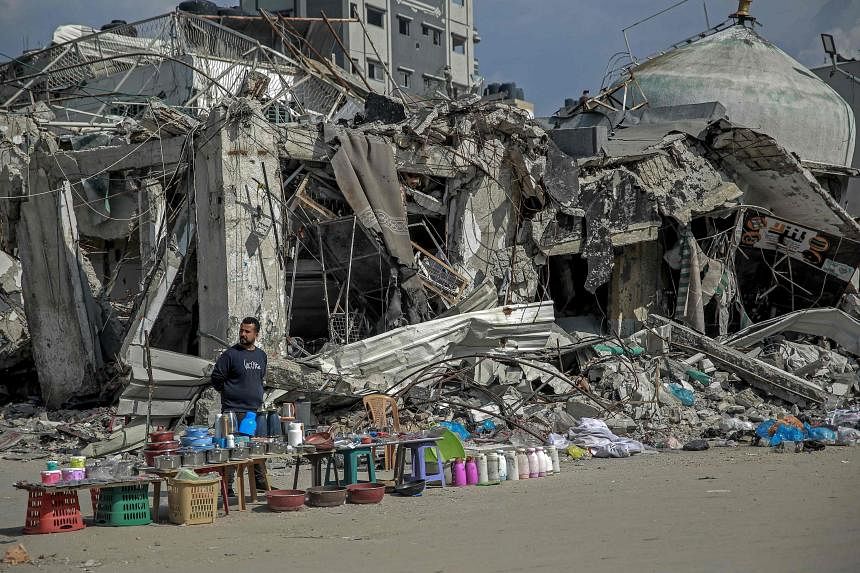Synopsis: Every first and third Sunday of the month, The Straits Times analyses the beat of the changing environment, from biodiversity conservation to climate change.
Even in peace times, militaries are huge emitters of the greenhouse gasses that drive global warming. The US military with its global network of bases, has a particularly large carbon footprint - and outsources it to host countries who must account for it under their own reports to the United Nations.
Humanity is at war in two places currently - Ukraine and the Middle East - with several other low-level conflicts in different parts of the globe, and military expenditure on the rise.
Historical data shows that past wars produced staggering amounts of greenhouse gasses. The destruction of forests in Vietnam in the 1960s by the US’s use of the chemical herbicide Agent Orange is estimated to have generated emissions in the range of 300-400 million tonnes of carbon dioxide (CO2) - about seven to eight times the annual emissions of the country of Switzerland.
The burning of oil wells by then-dictator Saddam Hussein’s army in 1990 as western coalition forces drove Iraqi forces out of Kuwait, generated probably more than 400 million tonnes.
Until recently however, the carbon emissions of wars and militaries were not seriously considered. When the Kyoto Protocol was negotiated in 1997, the United States pushed for the exclusion of bunker fuels - essentially transport fuel for ships and airplanes, much of which is used by its military.
That is slowly changing. While militaries’ carbon footprints are trending downwards in line with other economic sectors, as economies broadly become more fuel efficient, conflicts sharply spike CO2 emissions, and any increase in geopolitical conflict risks diverting taxpayer funding from climate adaptation and mitigation programmes.
There is now a clear view in the United Nations, that this dilemma must be addressed, says University of Zurich climate policy expert and senior founding partner of Perspectives Climate Group Dr Axel Michaelowa, in conversation with Straits Times Global Contributor Nirmal Ghosh in this episode of the Green Pulse podcast.
Highlights of conversation (click/tap above):
3:30 Impact of Agent Orange on forest destruction during the Vietnam War; carbon emissions in the range of 300 to 400 million tons
4:57 Conflict in Gaza - the destruction of buildings and emissions of 30 to 40 million tons
6:10 How 10 to 15 years of opportunity for mitigation was lost due to the United States advocating to exempt the need to report and cover emissions from ships and planes - driven mainly by military.
9:05 With US bases outside of its country, these substantial emissions would be accounted under the country where the base is located.
11:25 The indirect consequence of geopolitical conflicts on increased carbon emission
14:13 International recognition that carbon emissions from militaries and conflicts need to be accounted for.
Produced by: Nirmal Ghosh (nirmal@sph.com.sg), Ernest Luis, Hadyu Rahim & Amirul Karim
Edited by: Amirul Karim
Follow Green Pulse Podcast here and rate us:
Channel: https://str.sg/JWaf
Apple Podcasts: https://str.sg/JWaY
Spotify: https://str.sg/JWag
SPH Awedio app: https://www.awedio.sg/
Website: http://str.sg/stpodcasts
Feedback to: podcast@sph.com.sg
Read ST’s Climate Change microsite: https://www.straitstimes.com/climate-change
---
Discover more ST podcast channels:
COE Watch: https://str.sg/iTtE
In Your Opinion: https://str.sg/w7Qt
Asian Insider: https://str.sg/JWa7
Health Check: https://str.sg/JWaN
Green Pulse: https://str.sg/JWaf
Your Money & Career: https://str.sg/wB2m
ST Sports Talk: https://str.sg/JWRE
#PopVultures: https://str.sg/JWad
Music Lab: https://str.sg/w9TX
Discover ST Podcasts: http://str.sg/stpodcasts
---
Special edition series:
True Crimes Of Asia (6 eps): https://str.sg/i44T
The Unsolved Mysteries of South-east Asia (5 eps): https://str.sg/wuZ2
Invisible Asia (9 eps): https://str.sg/wuZn
Stop Scams (10 eps): https://str.sg/wuZB
Singapore’s War On Covid (5 eps): https://str.sg/wuJa
---
Follow our shows then, if you like short, practical podcasts!


